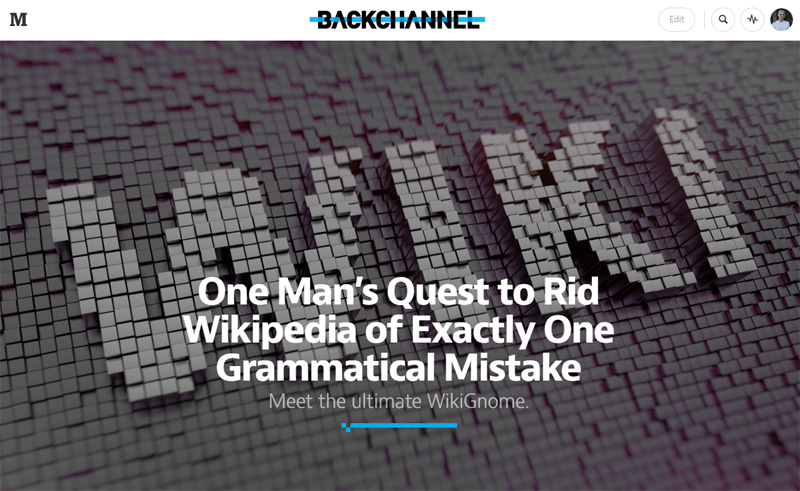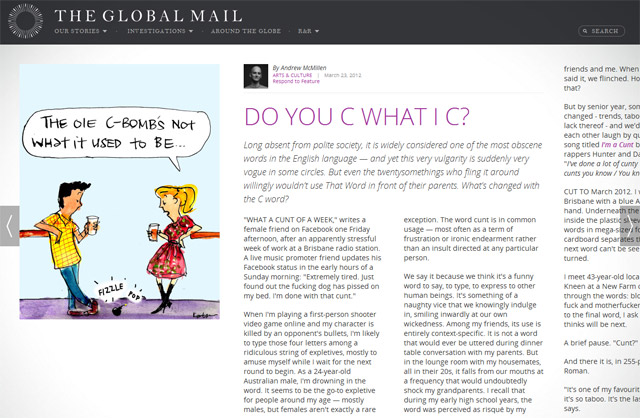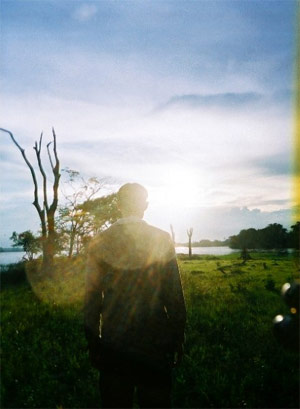Backchannel story: ‘Meet The Ultimate WikiGnome’, February 2015
My first story for Backchannel, the technology section of Medium.com. Excerpt below.
One Man’s Quest to Rid Wikipedia of Exactly One Grammatical Mistake
On a Friday in July 2012, two employees of the Wikimedia Foundation gave a talk at Wikimania, their organization’s annual conference. Maryana Pinchuk and Steven Walling addressed a packed room as they answered a question that has likely popped into the minds of even the most casual users of Wikipedia: who the hell edits the site, and why do they do it?
Pinchuk and Walling conducted hundreds of interviews to find out. They learned that many serious contributors have an independent streak and thrive off the opportunity to work on any topic they like. Other prolific editors highlight the encyclopedia’s huge global audience or say they derive satisfaction from feeling that their work is of use to someone, no matter how arcane their interests. Then Walling lands on a slide entitled, ‘perfectionism.’ The bespectacled young man pauses, frowning.
“I feel sometimes that this motivation feels a little bit fuzzy, or a little bit negative in some ways… Like, one of my favorite Wikipedians of all time is this user called Giraffedata,” he says. “He has, like, 15,000 edits, and he’s done almost nothing except fix the incorrect use of ‘comprised of’ in articles.”
A couple of audience members applaud loudly.
“By hand, manually. No tools!” interjects Pinchuk, her green-painted fingernails fluttering as she gestures for emphasis.
“It’s not a bot!” adds Walling. “It’s totally contextual in every article. He’s, like, my hero!”
“If anybody knows him, get him to come to our office. We’ll give him a Barnstar in person,” says Pinchuk, referring to the coveted virtual medallion that Wikipedia editors award one another.
Walling continues: “I don’t think he wakes up in the morning and says, ‘I’m gonna serve widows in Africa with the sum of all human knowledge.’” He begins shaking his hands in mock frustration. “He wakes up and says, ‘Those fuckers—they messed it up again!’”
Giraffedata is something of a superstar among the tiny circle of people who closely monitor Wikipedia, one of the most popular websites in the English-speaking world. About 8 million English Wikipedia articles are visited every hour, yet only a tiny fraction of readers click the ‘edit’ button in the top right corner of every page. And only 30,000 or so people make at least five edits per month to the quickly growing site.
Giraffedata—a 51-year-old software engineer named Bryan Henderson—is among the most prolific contributors, ranking in the top 1,000 most active editors. While some Wikipedia editors focus on adding content or vetting its accuracy, and others work to streamline the site’s grammar and style, generally few, if any, adopt Giraffedata’s approach to editing: an unrelenting, multi-year project to fix exactly one grammatical error.
To read the full story, visit Backchannel.


